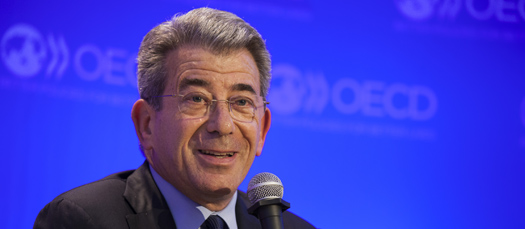Towards a more human economy

As the world continues to undergo a process of profound transformation, the time has come for us to rethink our traditional growth models. The challenge for both society and the business community is one and the same: can we identify new resources to foster growth that is more harmonious and more focused on the needs of human beings? As chief executive officer of Sodexo, I have every reason to believe we can. For the past 50 years our group has grown by placing people at the very core of our business model, of our organisation, and of the relationships we have with the community.
Sodexo was born with the conviction that economic progress and human progress converge when people’s quality of life is key for companies and society.
Improving quality of life is our business and our core mission. Today Sodexo provides more than 100 different quality-of-life services, employs more than 420,000 people, and serves 75 million customers in 80 countries. We work in office buildings, hospitals and schools, universities and penitentiaries, at remote sites and with individuals in their homes. We are a company of people at the service of other people. This is how we go about creating value, for our company and for our clients.
Our beliefs are increasingly shared by economic decision-makers: 66% of business leaders are totally convinced of the importance of quality of life and 57% recognise its significant impact on an organisation’s performance.
This vision of a more people-centric economy governs Sodexo’s internal practices and our relations with the communities where we operate.
As “a company of people at the service of other people”, we are committed, first of all, to being a model employer. As the 18th largest employer in the world, Sodexo’s operations have a major impact on local economies. First, because having a job means more than taking home a pay cheque. It means acquiring status and making a significant contribution to society. It means taking pride in being able to support one’s family. It means being able to afford the cost of medical treatment and of sending one’s children to school. It means expanding the range of possibilities for employees as well as for their loved ones. Ensuring the widest possible access to employment, providing steady jobs for 420,000 people, offering training to help them move up the career ladder–Sodexo demonstrates not only how employees are, of course, essential to the company’s growth, but how they ultimately contribute to the sustainable development of local economies.
Responsible supply chain
Sodexo’s contribution to local economies goes even further, and I’d like to mention one initiative I find particularly compelling: our Supply Chain Inclusion Program.
The OECD, which has partnered with Sodexo since 2013 to promote the quality of life as a key factor of development, has shown in a worldwide study that small to medium-sized enterprises (SMEs) account for 60-70% of GDP and 70-90% of total employment. At Sodexo we have long believed that such businesses can play a crucial role in the creation of jobs and the development of local economies. We have always worked with local suppliers, but since 2013 we have gone even further and, by way of our Supply Chain Inclusion Program, we have strengthened our commitment to effective and measurable actions on behalf of sustainability.
Our Supply Chain Inclusion Program establishes universal procurement guidelines. The aim is to encourage Sodexo entities to include more SMEs among their suppliers by 2020 and to enable those suppliers to take advantage of training to help them boost their quality and competitiveness. The Supply Chain Inclusion Program has already been deployed in 32 countries where Sodexo is present. With performance indicators in place to monitor progress, the Supply Chain Inclusion Program benefits organisations as diverse as a small maintenance company in the US, a co-operative farm in Angola and organic vegetable farmers in France.
Sodexo is particularly committed to diversity, and we have chosen to support those SMEs with an exemplary record on diversity and inclusion. In North America, for example, we work with 3,500 SMEs that promote diversity, and we have been singled out for our commitment to companies managed by people with disabilities.
The programme also aims to prioritise procurement from companies run by people from minority groups and from populations at risk. We have worked alongside NGOs with isolated communities in Peru as well as with indigenous peoples in Australia and Canada. We set up, for example, training programmes to help small Peruvian producers reach international standards. Suppliers that complete these training sessions become certified, making them a reference for Sodexo and other buyers, and giving them the possibility to broaden their potential market share.
During the Clinton Global Initiative’s last annual conference we announced another milestone of the Supply Chain Inclusion Program: by 2017, Sodexo will invest US$1 billion with 5,000 SMEs, 1,500 of which are run by women. This commitment should lead to the creation of more than 250,000 jobs over the course of the next three years.
SMEs created by women are primary candidates for this initiative. Since the start of the Supply Chain Inclusion Program, 16 entities have put in place specific initiatives on behalf of these companies. Much is at stake: only one-third of SMEs in the world are actually run by women. With the gap varying from country to country, there is considerable potential for growth, and Sodexo’s actions announced during the Clinton Global Initiative conference address and strengthen that potential. Lastly, we are going to work with WEConnect, an international association that identifies, trains and certifies companies held by women in Australia, Canada, Chile, India, Peru and the UK.
I’m absolutely convinced that placing people at the heart of business strategy is the only way to create sustainable value. Innovation, financial strategy–these are pointless if they aren’t also backed up by a long-term vision of how we need to contribute to the global progress of the local communities and societies in which we operate.


